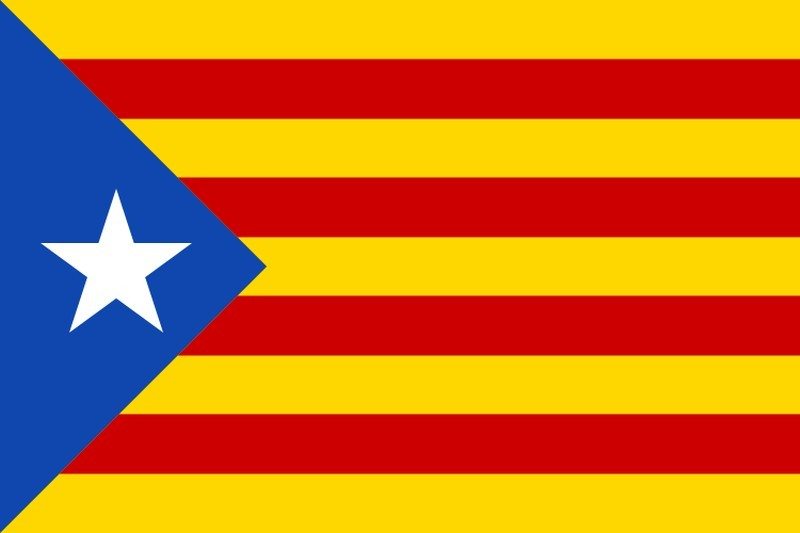
Socialistisk Biblioteks Tidslinje med links til begivenheder og personer i 2017.
Se også Index over personer, organisationer/partier og værker (som bøger, malerier, mm.), steder, begivenheder, mv., der er omtalt på hele Tidslinjen, titler og indhold på emnelisterne osv.
Året 2017
- A last look back at 2017. By Steve Eason (RS21: Revolutionary Socialism in the 21st Century, January 6, 2018)
- Favourites of 2017 (RS21: Revolutionary Socialism in the 21st Century, December 30, 2017). “Our reviewers recommend their favourite music, films, books and TV of 2017.”
- Best films of 2017, and other matters. By David Walsh and Joanne Laurier (World Socialist Web Site, 30 December 2017)
- Pop and jazz in 2017. By Hiram Lee, Matthew Brennan and Nick Barrickman (World Socialist Web Site, 30 December 2017)
- Best of the worst year, part 1 (SocialistWorker.org, December 18, 2017). “2017 did have some welcome relief in music, books and movies.” + Part 2 (19 December 2017).
- Best books of 2017 (Michael Roberts Blog: blogging from a marxist economist, December 21, 2017)
- Forecast for 2017 (Michael Roberts Blog: blogging from a marxist economist, December 28, 2016)
- Forecast for 2018: the trend and the cycles (Michael Roberts Blog: blogging from a marxist economist, December 29, 2017)
- 2018: the way forward (Counterfire, January 1, 2018). “Alex Snowdon looks back at the political developments of the last year with a view of what to expect from 2018.”
1. januar 2017
Sundhedsstyrelsen sletter transkønnethed på listen over psykiske lidelser.

- Danmark fjerner transkønnethed fra sygdomsliste. Af Kim Kristensen (Information.dk, 23. december 2016)
- Transkønnethed er ikke længere en ‘forstyrrelse’ i sundhedssproget. Af Anders Bernhoft (Lbgt.dk, 20. december 2016)
Baggrund:
- Transkønnet (Wikipedia.dk)
- Transkønnede: Vi er ikke psykisk syge. Af Laura Na Blankholm (Modkraft.dk, 15. marts 2011. “Transkønnede kræver lovændring, så de fremover undgår diagnosen »psykisk syg« for at få hjælp til at skifte køn …”
- Vejledning om udredning og behandling af transkønnede (Retsinformation.dk). Gældende vejledning nr. 10353 af 19/12/2014, Sundheds- og Ældreministeriet.
- Stormløb mod Sundhedsstyrelsens nye retningslinjer for transkønnede. Af Rune Eltard-Sørensen og Lotte Knold (Modkraft.dk, 13. oktober 204).
Se også:
- Tidslinjen 3. januar 1981 om homoseksualitet og Sundhedsstyrelsens liste over psykiske lidelser.
- Modkraft’s emneord: trans + Transkønnede + Transaktivisme
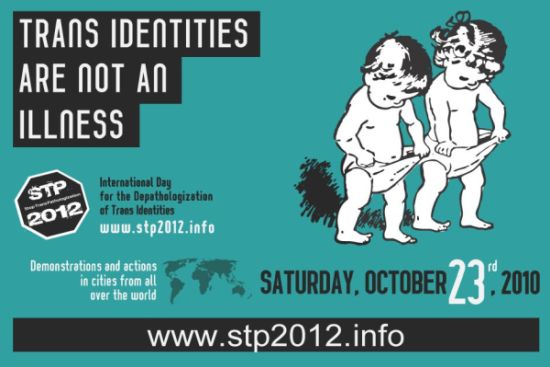
Plakat fra international demodag 2012
2. januar 2017
Den engelske kunstkritiker og forfatter John Berger dør i Frankrig (født 5. november 1926 i London).
Biografisk:
- John Berger (Wikipedia.org)
- John Berger (VersoBooks). Forlagets forfatterside.
The sense of art: In memoriam John Berger. By Mike Gonzalez (International Socialism, Issue 154, Spring 2017, p.95-100). “John Berger’s work covers an enormous range of activities: film, photography, novel, short story, television, painting, art history and more.”
John Berger, radical art critic, 1926-2017. By Sandy English and David Walsh (World Socialist Web Site, 7 February 2017). “John Berger, one of the most prominent left-wing figures in the field of English-language art criticism for over 60 years …”
John Berger opened up new ways of seeing. By Bob Light (Socialist Review, Issue 421, February 2017). “When John Berger died on the second day of the new year Marxism lost one of its finest thinkers and the left lost one of its most eloquent writers.”
Berger and Stalinism. By Lawrence Parker (Weekly Worker, Issue 1140, 2 February 2017). “John Berger had a complex and contradictory relationship with the world communist movement of the 1950s and 1960s.”
Borderless ambitions: a reflection on John Berger (Red Pepper, January 19, 2017). “Yasmin Gunaratnam reflects on John Berger’s gut solidarity with the stranger.”
John Berger and seeing politically. By Hugh Daniels (Solidarity, Issue 427, 18 January 2017). “Berger’s insistence on art as a political practice was the chief provocation of his work …”
As good as his word. By Sarah Black (Weekly Worker, Issue 1137, 12 January 2017). “Berger was interested in the way that western European art was used to show status.”
John Berger (1926–2017). By Mike Gonzalez (Jacobin: Reason in Revolt, 6 January 2017). “John Berger’s revolutionary insistence was that our reality could be seen differently, and altered by our intervention.”
John Berger was a firm Marxist who transformed art history. By John Molyneux (Socialist Worker, Issue 2535, 3 January 2017). “John Berger, who died on Monday at the age of 90, was the most important writer on art in the last 60 years or more.”
Seeing red: the wisdom of John Berger (Counterfire, January 3, 2017). “Chris Nineham reflects on his life and work.”
Good to know you! By Andy Merrifield (Verso Blog, 3 January 2017). “To weep for John is to weep on the shoulder of life.”
John Berger: a critic in the wrong place at the right time (Counterfire, October 5, 2012). “Alistair Cartwright reflects on the life, work and ideas of John Berger …”
John Berger: A biography. By Becca Dye (Socialist Review, Issue 373, October 2012). Review of Andy Merrifield, John Berger (Reaktion Books, 2012, 224 p.). “In this book Andy Merrifield leads us through a thematic biography of Berger, capturing his work through an analysis of his texts, photographs and films.”
Introduction to John Berger on Picasso. By Mike Gonzalez (International Socialism, Issue 40, Autumn 1988, p.105-110).
Defending Picasso’s late work. By John Berger (International Socialism, Issue 40, Autumn 1988, p.111-117)
The nature of mass demonstrations. By John Berger (International Socialism, No.34, Autumn 1968, p.11-12). “This article originally appeared in New Society, 23 May 1968. We think it important enough to deserve reconsideration.”
Video:
Litteratur:
- Landscapes: John Berger on Art. By John Berger. Edited by Tom Overton (Verso, 2016, 272 p.)
- Hold Everything Dear: Dispatches on Survival and Resistance. By John Berger (Verso, 2016, 160 p.)
- Portraits: John Berger on Artists. By John Berger. Edited by Tom Overton (Verso, 2015, 544 p.)
- Ways of Seeing (pdf). By John Berger (British Broadcasting Corporation and Penguin Books, 1973, 155 p.). Også som BBC-tv-serie. John Bergers standardværk.
Review by Julian Stallabrass (Socialist Review, Issue 296, May 2005)
Video: John Berger “Ways of Seeing”, 4 parts (BBC, 1997) (YouTube.com)
Se også:
Can Civilisations make sense of art when we have different ways of seeing? By Kenan Malik (The Guardian, 4 March 2018). “In dismissing Kenneth Clark’s simple story of western art, the BBC’s new series reveals its debt to the visionary thinker John Berger.”
12. januar 2017
Den polskfødte sociolog Zygmunt Bauman dør i Leeds, England. (Født 19. november 1925 i Poznan).
18. marts 2017
Den amerikanske rockmusiker Chuck Berry dør i St. Charles County, Missouri (Født 18. oktober 1926 i St. Louis, Missouri).
Chuck Berry (Wikipedia.dk). Se også den længere fremhævede engelske artikel.
Farvel til rockens grundfjeld. Af Ralf Christensen (Information.dk, 20. marts 2017). “En kæmpe, en genrebygger, en grænseoverskrider har forladt os.”
Rock ’n’ roll great Chuck Berry dead at 90. By Hiram Lee (World Socialist Web Site, 23 March 2017). “Berry’s music also gave expression to””and may have helped along””changing relations between blacks and whites in the postwar period.”
Chuck Berry (RS21: Revolutionary Socialism in the 21st Century, March 23, 2017). “Mitch Mitchell remembers Chuck Berry, one of the originators of Rock’n’roll.”
The brown eyed handsome man. By Jordy Cummings (Jacobin: Reason in Revolt, 22 March 2017). “Chuck Berry perfected simple but sophisticated working-class art.”
Se også:
How rock became white: The complications of cultural appropriation. Part 1. By Geoff Bailey Tempest, August 16, 2020). Part 2: A change is gonna come: Motown, The Beatles, and the rise of Soul (October 6, 2020) + Part 3: Whitewashing the history of Classic Rock (January 9, 2021).
31. marts 2017

Den amerikanske kunstner og bøsseaktivist Gilbert Baker dør New York City, New York. (Fødes 2. juni 1951, i Chanute, Kansas, USA).
Han designede det oprindelige 8-stribede regnbueflag i 1978 til afløsning for kz-lejrenes lyserøde trekant som logo for bøssebevægelsen i San Francisco. Ved produktionen af flaget blev det tilpasset til de nuværende 6 striber i LGBT-flaget. 
Rainbow Flag (LGBT) (Wikipedia.org). With history & ‘variations’!
I 208 designede Daniel Quasar ‘Progress Pride Flag’ med vinkler i lyserødt, lyseblå og hvidt (for at repræsentere transkønnede og sort + brun for at inkludere farvede (POC: people of colour).

Text: the Progress Pride Flag. Designed by artist Daniel Quasar in 2018, it has recently been raised to the roundly receptive salutes of the LGBTQ community, especially the younger, queer and politically gender conscious. For them, it has become the “mainstream, default symbol of the LGBTQ community.” (kilde: https://flagsforgood.com/collections/lgbtqia/products/progress-flag)

Kilde: og forstørrelser: https://shepherdexpress.com/lgbtq/my-lgbtq-pov/running-the-new-progress-pride-flag-up-the-flagpole/
Links:
- Regnbueflaget (Vidensbanken om kønsidentitet). Med links.
- Gilbert Baker, whose rainbow flag flew over the rise of gay rights, dies at 65. By Matt Schudel (The Washington Post, April 1, 2017)
- Rainbow flag creator and activist Gilbert Baker has died at 65. By Tracy E. Gilchrist (Advocate, March 31, 2017) + Video: Baker and Jones discuss the first rainbow flags in this snippet of a PBS documentary (5:43 min.)
- Rainbow flag (LGBT movement) (Wikipedia.org)
- (ideo: Gilbert Baker on the history, beauty and magic of the rainbow flag
(YouTube.com, 4:46 min.)Performance, Protest & Politics: The Art og Gilbert Baker.(the GLBT Historical Society Museum -

Englsk text: “Designer Valentino Vecchietti has added the intersex flag – yellow with a purple circle in the centre – to the Pride Flag” (Kilde: The Sun: https://www.thesun.co.uk/news/15218886/what-is-the-new-pride-flag-2021/
Se også:
- LGBTQIA-ordbog (LGBT.dk/LGBT-viden). “… begreber inden for områderne seksuel orientering og kønsidentitet … + begreber, som ikke er alment kendte …”
Bl.a. opslagsordet ‘intersex’ (se ovenfor).
Ordbogens Indhold: Alfabetisk oversigt– Køn – Romantisk – Øvrige.

Regnbueflag bruges også i en 7-stribet udgave i fredsbevægelsen, ofte påtrykt PEACE, eller på italiensk PACE (fred).
- Peace flag (Wikipedia.org)
11. maj 2017

Velfærdsforskeren Erik Jørgen Hansen dør (født 21. oktober 1935 i Bramming v. Esbjerg).
Links:
- Erik Jørgen Hansen (Wikipedia.dk)
Erik Jørgen Hansen afslørede velfærdssamfundet som et klassesamfund. Af Rune Lykkeberg (Information.dk, 20. maj 2017)
‘En marxistisk sociolog omfavnet af de borgerlige’. Af Mette-Line Thorup (Information.dk, 16. maj 2017)
Velfærdsstaten er for middelklassen – de svageste har vi glemt. Af Christian Bennike (Information.dk, 1. april 2017). Interview med Erik Jørgen Hansen.
Socialdemokraterne har opgivet kampen for lighed. Af Erik Jørgen Hansen (Politiken.dk, 21. marts 2016)
Sandheden er vigtigere end vennerne. Af Anita Brask Rasmussen (Information.dk, 14. januar 2006). Interview med Erik Jørgen Hansen.
13. maj 2017
Tidl. chefredaktør på dagbladet Information, journalist og aktive VS’er Vibeke Sperling dør. (født 26. januar 1945 i Aalborg).

Vibeke von Sperling (Gravsted.dk) med kort biografi
Vibeke Sperling (Wikipedia.dk)
Vibeke Sperling (1945-2017) (Dansk Kvindebiografisk Leksikon)
Hun stod for alt, hvad venstrefløjen rummede af intellekt og kritik, og hun stod fast! Af Karen Syberg (Information.dk, 15. maj 2017)
2. juni 2017
Folketinget vedtager på forslag af Enhedslisten med stemmerne 75-27 (Socialdemokraterne var imod, som det eneste parti) at afskaffe straffelovens paragraf 140 (‘blasfemiparagraffen’): »Den, der offentlig driver spot med eller forhåner noget her i landet lovligt bestående religionssamfunds troslærdomme eller gudsdyrkelse, straffes med bøde eller fængsel indtil 4 måneder.«
Fjernelsen giver lejlighedsvis anledning til debat på venstrefløjen, fx i forbindelse med Rasmus Paludans antimuslimske had-stunts (se Tidslinjen 14. april 2019).
Links:
Blasfemi (Wikipedia.dk)
Blasfemiparagraffen er blevet afskaffet (Danmarks Radio, 2. juni 2017). Med oversigt over historiske blasfemi-sager.
L 170: Forslag til lov om ændring af straffeloven (Folketinget.dk). Ophævelse af straffelovens blasfemibestemmelse. Med link til Folketingstidendes betænkninger og referat af bl.a. ordførertaler + baggrundsmaterialer bl.a. om ytringsfrihed, Koran-bortskaffelse, mm.
Hvornår har censur og forbud gavnet nogen som helst? (Solidaritet.dk, 27. maj 2019). “Preben Wilhjelm langer i dagens Signatur ud efter forbud og censur, og vil fastholde afskaffelsen af blasfemiparagraffen.”
Se også på Socialistisk Bibliotek:
Tidslinjen 15. september 1970 om Jesper Jensens sang Øjet.
Linksamlingen Muhammed-tegningerne.
12. august 2017
I byen Charlottesville, Virginia, USA, demonstrerer USAs højrefløj (“alt right”) imod nedrivning af statue for borgerkrigsgeneral for Syden, Robert E. Lee, under paroler som “You will not replace us” og”Blood and soil”. I moddemonstrationen bliver en kvindelig moddemonstrant myrdet ved en bevidst påkørsel ned personbil.
“Alt-right” protesters who have gathered for the weekend Unite the Right rally marched in a long column over the short distance to the campus, chanting slogans like “You will not replace us” and “Blood and soil”.
Links:
- Unite the Right rally [Charlottesville rally) (Wikipedia.org)
- Robert Edward Lee Sculpture (Wikipedia.org)
USA: Vi mindes Heather Heyer (Autonom Infoservice, 12. august 2019). “Det er i dag to år siden, at Heather Heyer blev myrdet af en hvid racist … I den anledning bringer vi en tidligere beretning om hændelserne i Charlottesville den 12. august 2017.”
US South – monuments to racism must fall. By Brian Kelly (Socialist Worker, Issue 2572, 16 September 2017, p.14-15). “The Confederate statues being brought down across the southern US states are monuments to slavery that were built to bolster white supremacy. They’ve got to go …”
In defense of anti-fascism (SocialistWorker.org, September 15, 2017). “Paul D’Amato examines the critiques of anti-fascist protesters for being violent that began appearing after the successful counterprotests against the far right last month.”
Charlottesville is a call to action against fascism (SocialistWorker.org, August 14, 2017). “Katherine Nolde, Richard Capron and Scott McLemee round up on-the-spot reports from the deadly confrontation between the far right and anti-racists in a Virginia city.
Anti-racists in a Virginia city 100 miles from the nation’s capital showed they won’t be intimidated by the far right (SocialistWorker.org, July 18, 2017). “Danny Katch draws out the lessons of their struggle.”
Se også:
- Alt-right (Wikipedia.org)
Five book plan: The Radical Right in America (Verso, Blog, 20 October 2017). “David Neiwert, author of Alt-America, picks his essential reads on the American far right.” See also David Neiwert: Oregon, Capital of Alt-America (Verso, Blog, 19 October 2017).
Alt-Right: A primer on the online brownshirts. By Chip Berlet (Logos: A Journal of modern Society & Culture, Vol.16, No.1-2, Spring 2017)
Ctrl-Alt-Delete: The origins and ideology of the Alternative Right. By Matthew N. Lyons (Political Research Associates, January 20, 2017). “An antifascist report on the far right movement that embraced Donald Trump”. See also Matthew N. Lyons: An Alt Right update (ibid., August 7, 2017) + Threewayfight.blogspot.
Fascism and Anti-Fascism: reflections on recent debates on the US Left. By Charlie Post (Salvage, 10 October 2017). “The election of Donald Trump and the resulting uptick of racist violence since November 2016 has placed the issue of fascism back on the agenda of the US left.” See also Monique Dois: Free speech and fighting the Right on campus (International Socialist Review, Issue 106, Autumn 2017)
1. september 2017
Den danske højskolemand, samfundsdebatør, litteraturforsker m.m. Jørgen Knudsen dør (født 22. marts 1926).
Links:

- Jørgen Knudsen (Wikipedia.dk)
- Tale ved Jørgen Knudsens bisættelse. Af Else Lidegaard (Georg Brandes Selskabet, 9. september 2017)
- [90 års fødselsdagshilsen] + indskannet tekst af Hans Hertel: “Den seje humanist”, Politiken, 20. marts 2016 (Georg Brandes Selskabet)
- “Venstrefløjen er desværre lidt tam i dag” (Det Ny Clarté, 5. september 2017). 85-års fødselsdagsinterview med Jørgen Knudsen.
Litteratur:
- GB: en Georg Brandes-biografi. Af Jørgen Knudsen (Gyldendal, 2008, 644 s.). Bygger på Jørgen Knudsens 8 binds-værk: Georg Brandes (Gyldendal, 1985-2004)
Anmeldelser:
Stor vovehals, stor krukke. Af David Rehling (Information.dk, 29. februar 2008)
Fremragende værk om Georg Brandes. Af Eric Danielsen (Arbejderen, 14. juli 2004). P.t. ikke online.
Georg Brandes – den uovervindelige taber. Af Torben Brostrøm (Information.dk, 3. april 2004)
Se også:
- Tidslinjen 4. februar 1842 om Georg Brandes.
- Georg Brandes Selskabet (site)
1. oktober 2017
Lokalregeringen i Catalonien afholder folkeafstemning om catalansk selvstændighed fra den spanske stat, som erklærer afstemningen forfatningsstridig og spansk politi slår hårdt til mod afstemningssteder.
Folkeafstemningen følges op af generalstrejke og en ensidig selvstændighedserklæring af det nationale parlament 27. oktober 2017 (Den Catalanske Republik), som får Madrid-regeringen til at overtage selvstyret, og bl.a. den politiske leder går i eksil. Men deltager i regeringens dikterede valg 21. december 2017, der får næsten samme resultat som i det tidligere parlament.
På dansk (+ svensk):
- Catalunya (Katalonien, Catalonia) (Leksikon.org)
- Katalansk uavhengighet (No.wikipedia.org). Lille på norsk, ingen på dansk, men længere på engelsk: Catalan independence movement (Wikipedia.org)
- Texter om Katalonien (Marxistarkiv.se)
Catalonien: “Intet er glemt, intet er tilgivet” (Autonom Infoservice, 2. oktober 2018). “Et år efter den kriminaliserede folkeafstemning om uafhængighed for Catalonien gik omkring 180.000 mennesker på gaden i går for at demonstrere for uafhængighed af Spanien.”
Det progressive standpunkt i vildrede. Af Sara Høyrup (Kritisk Debat, 14. august 2018). “Udfordringen for det progressive standpunkt i Spanien er derfor at holde sig fri af både den ene og den anden nationalchauvenisme og at kombinere indsatsen for social retfærdighed med stålsat antinationalisme.”
Forsinket føderalisme i et ungt demokrati: Catalonien og den spanske stat. Af Sara Høyrup (Arbejderen.dk, 9. februar 2018). “Professor Jordi Gràcia taler uforfærdet for en tredje vej mellem separatisme og unionisme, mens kollegerne holder lav profil.”
Når flagsvingeri skygger for klassekampen. Af Niels Frølich (Kritisk Debat, 26. december 2017). “Selvstændighedspartierne hentede ikke deres stemmer i arbejderkvartererne eller i arbejderklassen som sådan.”
Catalansk uafhænighed i historisk perspektiv. Del I: Historien. Af Niels Frølich (Kritisk Debat, 15. december 2017) + Del 2: Nutiden (ibid., 15. februar 2018) + Del 3: Forfatningskampen (ibid., 16. april 2018). “Den første artikel behandler tiden frem til den spanske borgerkrigs afslutning i 1939 … I den sidste del behandles tiden fra borgerkrigens afslutning op til dagens Catalonien.”
Forblændelse i Spanien. Af Jan Helbak (Kritisk Debat, 13. november 2017). “Det gælder hele den spanske arbejderklasse og de brede lønmodtagergrupper og ikke blot catalanerne.”
Catalonien under pres (Arbejderen.dk, 31. oktober 2017). Med kommentarer fra forskellige venstrefløjspositioner.
Tre myter om Cataloniens uafhængighedsbevægelse. Af Francisco de Borja Lasheras (Kritisk Debat, 16. oktober 2017). “En romantisk indramning af kriser i udlandet, hvor selvbestemmelse er på dagsordenen, er en almindelig fejl.”
Spanien: Folkeafstemning om Cataloniens fremtid (Autonom Infoservice, 30. september 2017)
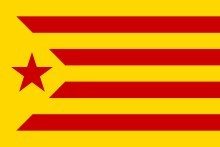
In English:
- Catalan independence movement (Wikipedia.org)
- Catalyuna: Abbreviated Timeline. By Bayla Ostrach (Against the Current, Issue 192, January-February 2018). 1978 – 21 October 2017.
- Catalonia: a reading list (Counterfire, November 7, 2017). “As the Catalan crisis grows, Chris Bambery provides a comprehensive reading list to understand more about it’s history.”
- Index: Catalonia (International Viewpoint)
A People’s History of Catalonia. By Chris Bambery (Counterfire, brilliantly tells the story of an oppressed people’s struggle through the centuries.”
Should socialists support Catalonia’s independence movement? (International Socialist Review, Issue 110, Fall 2018). “The struggle over Catalonia will have major impact on the shape of politics in the Spanish state for years to come. To understand what is at stake, and what pos tion socialists should take, the ISR is publishing here the contribution of Eva María, a member of the International Socialist Organization.”
Self Determination and class struggle (pdf). By Oscar Simon (Irish Marxist Review, Vol.7, No.21, 2018). “Since 2010 anti-capitalists in Catalonia have been faced with more or less all the dilemmas posed by the national question: the inter-class nature of national movements; the incomprehension of the independence movement by most of the left in the rest of the Spanish state; how to maintain the political independence of revolutionaries …”
Catalonia’s independence movement: A strategic assessment (International Socialist Review, Issue 109, Summer 2018). “Josep Maria Antentas … roots the crisis over Catalonia in the general crisis of the Spanish state stemming from the negotiated end to the fascist Franco dictatorship, as codified in the Constitution of 1978.”
After the elections, what next for Catalonia? (RS21: Revolutionary Socialism in 21st Century, January 18, 2018). “Andy Durgan outlines the political landscape following Catalonia’s recent elections and discusses potential outcomes for left organisations in the region.”
Two Catalonias (Jacobin: Reason in Revolt, 2 January 2017). An interview with Steven Forti: “The December 21 Catalan election saw a narrow pro-independence majority and a region more divided than ever.”
The roots of Spanish rage. By Jorge Tamames (Jacobin: Reason in Revolt, 18 November 2017). “As Spain prepares to mark the anniversary of Franco’s death, what is behind its latest upsurge in nationalism?”
Catalonia, class and independence. By Héctor Sierra (Socialist Review, Issue 429, November 2017). “The Spanish state’s violent response to the Catalan independence referendum last month was shocking, but now is the time for the left to take a lead.
Catalonia: past and future. By Luke Stobart (Jacobin: Reason in Revolt, 10 October 2017). “As Catalonia prepares to declare independence we examine the history and politics behind its independence movement.”
Dangerous games. By Paul Demarty (Weekly Worker, Issue 1173, October 5, 2017). “There is a perverse rationality to the Spanish repression of the Catalan independence campaign.”Catalan’s decision. By Josep Maria Antentas (Jacobin: Reason in Revolt, 20 September 2017). “How independence vote came about — and why it should have the Left’s support.”
Catalonia: From Referendum to Republic? (Jacobin: Reason in Revolt, 3 October 2017). “Amid a general strike in Catalonia, we speak to Lluc Salellas of anticapitalist party CUP about the next steps for the independence movement.”
Catalonia’s right to decide (SocialistWorker.org, September 26, 2017). “Jaime Pastor, a leading member of the revolutionary socialist organization Anticapitalistas explains the contending forces and the stakes involved.”
Podemos, Catalonia and the workers’ movement in the Spanish state. By Héctor Sierra. (International Socialism, Issue 155, Summer 2017, p.51-72).”… the key issue that can alter the balance of power, throwing the Spanish state’s rulers on the defensive, is Catalonia.”
Se også om det nationale spørgsmål / On the national question:
- Nationella frågan idag – Katalonien och Kurdistan (pdf). Av Martin Fahlgren (Marxistarkiv.se, 27. december 2017). “Nationella frågan har tveklöst fått förnyad aktualitet under de senaste årtiondena. Hur har marxister traditionellt sett på frågan?”
- Marx, Engels and the National Question. By Peter Solenberger (Against the Current, Issue 196, September-October 2018)
- After Catalonia’s independence referendum – national struggles, Marxism and class (Socialist Worker, Issue 2575, 9 October 2017). “Dave Sewell looks at how to judge national struggles.”
- The National Question – some basic principles. By John Molyneux (Irish Marxist Review, Vol.2, No.8, 2013, p.4-13)
- Catalonia: towards independence? By Andy Durgan (Irish Marxist Review, Vol.2, No.8, 2013, p.14-21)
- Marxism, nationalism and the national question after Stalinism (pdf). By Hillel Ticktin (Critique: Journal of Socialist Theory, Issue 36-37, June 2005, p.15-48)
- Revolutionary internationalism and the national question. By Paul Le Blanc (International Viewpoint, Issue 344, October 2002). Review of Michael Löwy, Fatherland or Mother Earth? Essays on the national question (Pluto Press/IIRE, 1998, 108 p.)
- Marxism and Nationalism. By Tom Lewis (International Socialist Review, Issue 13, August-September 2000) + Part 2 (Issue 14, October-November, 2000)
- Marxism and the National Question. By Alan Woods and Ted Grant (In Defence of Marxism, 25 February 2000). A four-part document.
- Marxism and the National Question. By Alex Callinicos (From Chris Bambery (ed.), Scotland: Class and Nation (Bookmarks, 1999, p.37-49; online at Reds – Die Roten)
- The return of the national question. By Chris Harman (International Socialism, Issue 56, Autumn 1992, p.3-61)
- Marxismen og det nationale spørgsmål. Af Alex Callinicos (Fra Marxismen og det nationale spørgsmål, Internationale Socialister, 1991)
- Marxists and the National Question (pdf). By Michael Löwy (New Left Review, Issue 96, March-April 1976, p.81-100; online at Solidarity)
1. oktober 2017
Den ungarske marxistiske filosof István Mészáros dør (født 19.12.1930)

Links:
- István Mészáros (professor) (Wikipedia.org)
- István Mészáros Archive (Marxists Internet Archive)
- István Mészáros (Monthly Review). With 22 articles online.
Notes from the Editors: István Mészáros (1930–2017) (Monthly Review, Vol.69, No.7, December 2017). “István Mészáros … was one of the foremost political philosophers of the late twentieth and early twenty-first centuries, and a leading Marxist theorist.”
Capital’s historic circle is closing: The challenge to secure exit. By István Mészáros (Monthly Review, Vol.69, No.7, December 2017). “In June 2017, István Mészáros sent me a copy of the present article for publication in Monthly Review.”
Istvan Meszaros and Marx’s theory of alienation. By Judy Cox (Counterfire, November 19, 2017). “The late Hungarian philosopher explained how alienation can only be overcome by collective action which challenges capitalist relations of production.”
A Marxist philosopher (Weekly Worker, Issue 1173, 5 October 2017). “Hillel Ticktin remembers István Mészáros: The passing of István Mészáros is a loss to the left and to humanity. He dedicated his life to enlightening people on the nature of the movement to socialism. He will be long remembered.”
István Mészáros, pathfinder of socialism. By John Bellamy Foster (Monthly Review, Vol.61, No.9, February 2010). “This is the foreword to István Mészáros’ The Structural Crisis of Capital (Monthly Review Press, 2010). President Hugo Chávez of Venezuela presented Mészáros with the Libertador (Bolívar) Award for Critical Thought 2009 for his previous book.”
Time is lifting the fog. By Mark Bergfeld (International Socialism, Issue 125, Winter 2010). Review of Istvan Meszaros, The Challenge and Burden of Historical Time—Socialism in the Twenty First Century (Monthly Review Press, 2008): “Istvan Meszaros’s latest treatise is a mixture of extended essays, lectures and occasional pieces. The analysis ranges from structural unemployment and imperialism to ecological destruction and the crisis of capital.”
7. oktober 2017
Tidligere medlem af Europaparlamentet (1994-2003) for Folkebevægelsen mod EU og kandidat for Enhedslisten, juraprofessor Ole Krarup dør i Helsingør (født 17. marts 1935 i Århus). Ved siden af sit faglige arbejde som juraprofessor, deltog han i en række markante politiske retssager.
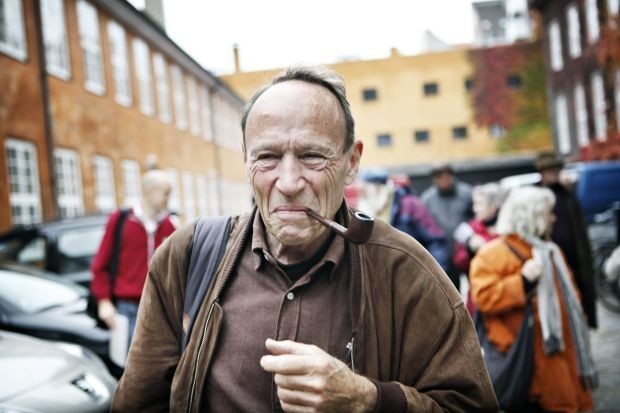
Se:
- Krarup, Ole (Leksikon.org)
- Ole Krarup (Wikipedia.dk)
- Mindeord: Ole Krarup. Af Ditte Staun (Arbejderen.dk, 11. oktober 2017)
- Marxist, partistifter og EU-modstander Ole Krarup er død (Information.dk, 10. oktober 2017)
- Ole Krarup er død. Af Freja Wedenborg (Folkebevægelsen mod EU, 10. oktober 2017)
- Ole Krarup (site). Med bl.a. Publikationsliste og Alle artikler (dokumenter fra juridiske sager, Krarup havde været involveret i).
15. oktober 2017
Den amerikanske skuespiller Alyssa Milano opfordrer i tweet på de sociale medier under hashtag #Metoo til at fortælle om selvoplevede seksuelle krænkelser og overgreb. Bliver til en række markante mediesager de efterfølgende måneder.

Se:
På dansk:
- #MeToo Leksikon.org)
- Me too (Wikipedia.dk). Med link til den langt større engelsksprogede artikel.
#meToo på tværs – en kommentar af en venstreradikal feminist. Af Inge K. Hansen (Autonom Infosevice, 6. marts 2018). “Det kom som forventet. Først en bølge af historier om seksuelle overgreb … Dernæst et omfattende backlash fra flere sider.”
#metoo. Af Anna Wolf (Socialistisk Arbejderavis, nr. 363, 1. februar 2018, side 11). “en række anklager … om adskillige seksuelle overgreb, er blevet en global antisexistisk kampagne med vidtrækkende konsekvenser”.
Litteratur:
Mænd der krænker kvinder: reflektioner i kølvandet på #MeToo. Af Kenneth Reinicke (Samfundslitteratur, 2018, 218 sider).
In English:
- Me Too movement (Wikipedia.org)
#MeToo from below. By Madeline Lane-McKinley (Commune, Issue 1, Fall 2018). “The revival of feminism as mass movement is a key feature of the Trump era. Will it be a feminism for elites or a revolutionary feminism from below?”
The year of #MeToo: Pulling back the curtain on women’s oppression. By Elizabeth Schulte (International Socialist Review, Issue 108, Spring 2018, p.16-29). “#MeToo may have begun with actors and celebrities with access to the media spotlight, but it had the potential to provide a platform for other women to tell their stories—including working-class and poor women who face harassment and assault on the job at alarming rates.”
The #MeToo Revolution. By the editors (Against the Current, Issue 192, January-February 2017). “The organized labor can play a big role in demanding a harassment-free environment, merging this movement with the struggle for decent wages.”
#MeToo shakes the Washington elite. By the editors (SocialistWorker.org, December 21, 2017). “Sexism goes all the way to the top in the U.S., but women have gained confidence from the #MeToo moment to keep up the pressure and hold powerful men accountable.”
The petition against Matt Damon and the “erasing” of Kevin Spacey. By David Walsh (World Socialist Web Site, 28 December 2017). “A number of recent developments point to the vehemently and dangerously antidemocratic character of the ongoing sexual witch hunt in the US.”
Ending the silence on workplace sexism (Socialist Review, Issue 430, December 2017). “Sally Campbell looks for collective solutions to a problem often experienced individually.” With link to the TUC report on sexual harassment.
The power of #MeToo. By Leia Petty (SocialistWorker.org, November 9, 2017) “… what the #MeToo campaign has done to spotlight the discussion of sexual assault–and the opportunities for taking the struggle for justice forward.”
#MeToo: a moral panic about men. By Ella Whelan (Spiked, 17 October 2017). “Scaremongering about sexual harassment is bad for women.”
The unexpected, paradigm-shifting power of #MeToo. By Lianna Brinded (Quartz, Blog, October 17, 2017). “I’ve known for nearly 20 years that those born wealthy had a head start compared with me in my chosen career. I’d accepted that …”
The Problem with the #MeToo Campaign. By Megan Nolan (Vice.com, Blog, October 17, 2017). “There is strength in solidarity, but I couldn’t help feeling some despair as the hashtag took off.”
Se også/See also:
Right-wing French Twitter campaign over Weinstein affair backs Macron. By Francis Dubois (World Socialist Web Site, 14 November 2017 ). “His government is … trying to mobilize hysteria against immigrants and working-class suburbs around the theme of sexual harassment.”
21. november 2017
Robert Mugabe træder tilbage som præsident i Zimbabwe, tiltrådte i april 1980. (Dør 21. november 2019).
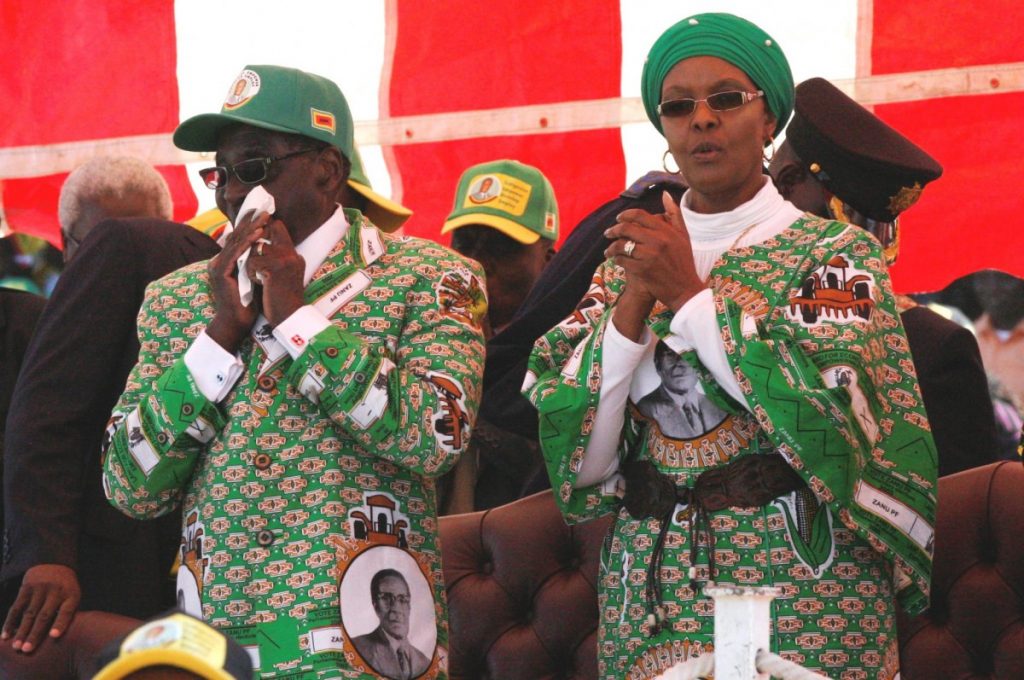
Links:
- Robert Mugabe (Wikipedia.dk). Med link til meget længere – og fremhævet – engelske artikel.
- Zimbabwe + Statistik (Leksikon.org)
- Kategori: Zimbabwe (Global Nyt)
- Topics: Zimbabwe (In Defence of Marxism)
Hvordan kunne Mugabe bevare magten? Af Karen Helveg Petersen (Arbejderen.dk, 8. december, 2017). “Zimbabwe er et ekstremt eksempel på jordspørgsmålets alvor. Mugabes magtbase var småbønder og krigsveteraner. Da han mistede hærens støtte, var det forbi.” Se også debatten længere nede ifm. Mahmood Mamdani (2008).
En analyse: Bye Bye Mugabe. Af Morten Nielsen (Afrika Kontakt, 27. november 2017; online på Internet Archive). “Efter kuppet i Zimbabwe: Grund til optimisme eller …”
Zimbabwe: the death of Mugabe and the hypocrisy of the West. By Ben Morken (In Defence of Marxism, 9 September 2019). “Since the death of Robert Mugabe last Friday, Western media outlets have been falling over themselves to show their distaste for the former dictator. What is not reported is that, for most of his 37-year rule, Mugabe was the darling of the West.”
Mugabe is dead: remember Chiadzwa. By Leo Zeilig (RS21, 6 September 2019). “The death of Robert Mugabe (1924-2019) is being celebrated by Zimbabweans around the world. The 2008 massacre at the Chiadzwa minefield deserves to stand as a testament to his rule.”
Robert Mugabe, Zimbabwe’s longtime president, dies at 95. By Bill Van Auken (World Socialist Web Site, 7 September 2019). “Mugabe was the last surviving leader of Africa’s anticolonial struggles who subsequently came to power in a newly independent nation.”
Zimbabwe after Mugabe. By Alex Callinicos (International Socialism, Issue 157, Winter 2018, p.9-23). “This journal has followed the fortunes of Mugabe and his party, the Zimbabwe African National Union-Patriotic Front (ZANU-PF), and of the struggle in Zimbabwe more broadly, since the 1970s so it is right that we should mark his fall.”
Why do so many Western leftists defend Robert Mugabe? By Benjamin Fogel (Jacobin: Reason in Revolt, 5 December 2017). “Apologetics for a kleptocratic tyrant have nothing to do with anti-imperialism.”
Goodbye and Good Riddance, Robert Mugabe. By Melusi Nkomo (Jacobin: Reason in Revolt, 27 November 2017). “Robert Mugabe was no socialist. He was a man obsessed with his own power and control.”
Britain’s colonial crimes in Zimbabwe (Socialist Worker, Issue 2582, 26 November 2017). “As Mugabe’s henchman Emmerson Mnangagwa takes the reins of the Zimbabwean state, Tomáš Tengely-Evans looks at how the crimes of imperialists shaped Zimbabwe’s history.”
Zimbabwe: Mugabe gone – but his regime remains in power (The Socialist, Issue 972, 22 November 2017). “Mugabe’s removal may embolden independent workers’ organisations to renew their struggles against the regime, as Weizmann Hamilton and Tinovimbanashe Gwenyaya of the Workers and Socialist Party (CWI South Africa) explain.”
Robert Mugabe resigns as president of Zimbabwe. By Chris Marsden (World Socialist Web Site, 22 November 2017). “Mnangagwa, who is to be Mugabe’s replacement, has no principled differences with the man for whom he acted as enforcer for decades.”
Robert Mugabe—how an anti-colonialist hero became an authoritarian nationalist. By Charlie Kimber (Socialist Worker, Issue 2581, 21 November 2017). “He went from being venerated by most of the country’s black workers and poor people to being hated by many who saw him as their tyrannical oppressor.”
Robert Mugabe’s downfall: a challenge to the ‘anti-imperialist’ left. By Louis Proyect (The Unrepentant Marxist, November 19, 2017). “For most on the left, Robert Mugabe was a symbol of anti-imperialist resistance and a shining example of how to promote economic development outside of the Washington Consensus.”
Mugabe’s fall creates a chance for real change in Zimbabwe. By Leo Zeilig (RS21: Revolutionary Socialism in the 21st Century, November 18, 2017). “We should celebrate the fall of Robert Mugabe. But hypocritical governments like Britain’s that are now attacking him supported him for years.”
The last days of Mugabe? By Leo Zeilig (Jacobin: Reason in Revolt, 26 July 2016). “New movements threaten Robert Mugabe’s authoritarian government in Zimbabwe. But they risk being co-opted by elites.”
Zimbabwe: Liberation nationalism, old and born again (Links: International Journal of Socialist Renewal, August 2010 ). “Richard Saunders considers ZANU-PF’s violent rebirth, the troubled origins of the current ‘unity’ government and the challenges ahead for Zimbabwe’s democratic transition.”
Zimbabwe: imperialism, hypocrisy and fake nationalism. By Leo Zeilig (International Socialism, Issue 119, Summer 2008, p.93-110). “It is vital that socialists steer a path between the authoritarian nationalism of Mugabe’s Zanu-PF and Western imperialism that is seeking to pull Zimbabwe back into its orbit.”
Lessons of Zimbabwe. By Mahmood Mamdani (London Review of Book, Vol.30, No.23, 4 December 2008). “Zimbabwe has seen the greatest transfer of property in southern Africa since colonisation … In social and economic – if not political – terms, this was a democratic revolution. But there was a heavy price to pay.” With debate/critique below the article. See also Association of Concerned African Scholars: Reflections on Mahmood Mamdani’s ‘Lessons of Zimbabwe’ (ACAS Bulletin, Issue 82, Summer 2009, 63 p.).
Zimbabwe: from liberation to dictatorship (Socialist Worker, Issue 2046, 10 April 2007). “The struggle against white rule in Zimbabwe in the 1970s galvanised a generation in the hope of a new Africa. Now the country has become a byword for repression. Leo Zeilig traces the death of a dream.”
Labor, the state, and the struggle for a democratic Zimbabwe. By Patrick Bond and Richard Saunders (Monthly Review, Vol.57, No.7, December 2005). “When Zimbabwe attained its first independent government in 1980, there were reasons to hope for a bright future … But 1991 was a turning point for Zimbabwe …”
Mugabe and the left (Solidarity & Workers’ Liberty, Issue 516, 11 September 2019). “Peter Tatchell spoke on Zimbabwe at a Workers’ Liberty meeting in 2005. What he said about Robert Mugabe has remained true for the following 14 years, up to Mugabe’s death on 6 September at the age of 95.”
Crisis in Zimbabwe (International Socialism, Issue 94, Spring 2002, p.75-96). “Leo Zeilig’s brief history of the Mugabe regime and analysis of the current crisis and the left in Zimbabwe.”
Zimbabwe on the brink (Socialism Today, Issue 47, May 2000). “Weizmann Hamilton, from the Democratic Socialist Movement, assesses the situation 20 years after independence.”
Political reawakening in Zimbabwe. By Patrick Bond (Monthly Review, Vol.50, No.11, April 1999). “This article makes the case that a potent cocktail of dashed hopes is now, finally, evoking a new consciousness and opening up new options for social resistance.”
Capital, state, socialism: Lessons of Zimbabwe. By Tom Meisenheider (Against the Current, Issue 51, July-August 1994). “The Republic of Zimbabwe was born in 1980 with a stated commitment to build a socialist society. By 1990 it made an ‘about-face’ to an avowedly capitalist model of development. What happened?”
Zimbabwe: The xext round. By John S. Saul (Socialist Register 1980, p.170-202). “Marxists and other progressives have quite correctly celebrated the success of the Zimbabwe African National Union (ZANU) in the Zimbabwe elections of 27-29 February of this year as a triumph of heroic proportions.”
Southern Africa after Zimbabwe. By Alex Callinicos & John Rogers (International Socialism, Issue 9, Summer 1980, p.1–43). “The victory of ZANU-PF and the installation of Robert Mugabe as prime minister of Zimbabwe proved, as we shall see, to be highly ambiguous.”
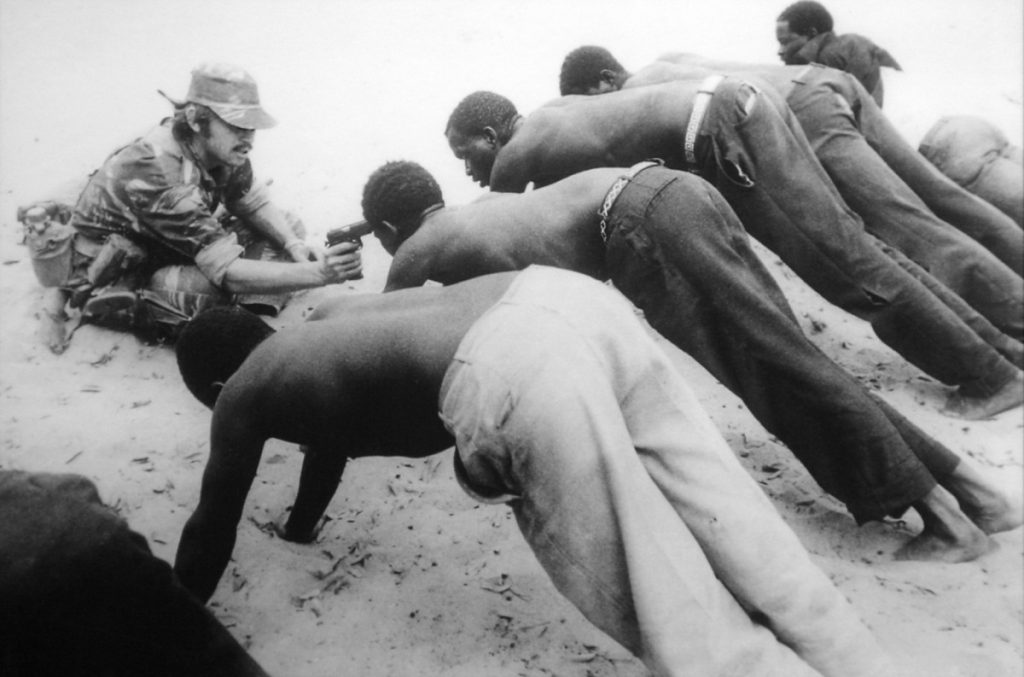
10. december 2017
Organisationen The International Campaign to Abolish Nuclear Weapons (ICAN) modtager Nobels Fredspris, uddelt af det norske storting …”for dens arbejde med at gøre opmærksom på de katastrofale humanitære konsekvenser af enhver brug af atomvåben har, og for sin banebrydende indsats for at opnå et traktat-baseret forbud mod brugen af sådanne våben”.

Links:
- The International Campaign to Abolish Nuclear Weapons (Ican) (Wikipedia.org)
- Ican (site). About Ican, Resources etc.
28. december 2017
I den iranske by Mashhad, starter protesterne mod prisstigninger og korruption, som i løbet af de følgende dage bliver mere omfattende både geografisk og politisk. Med fornyede protester 2018- .
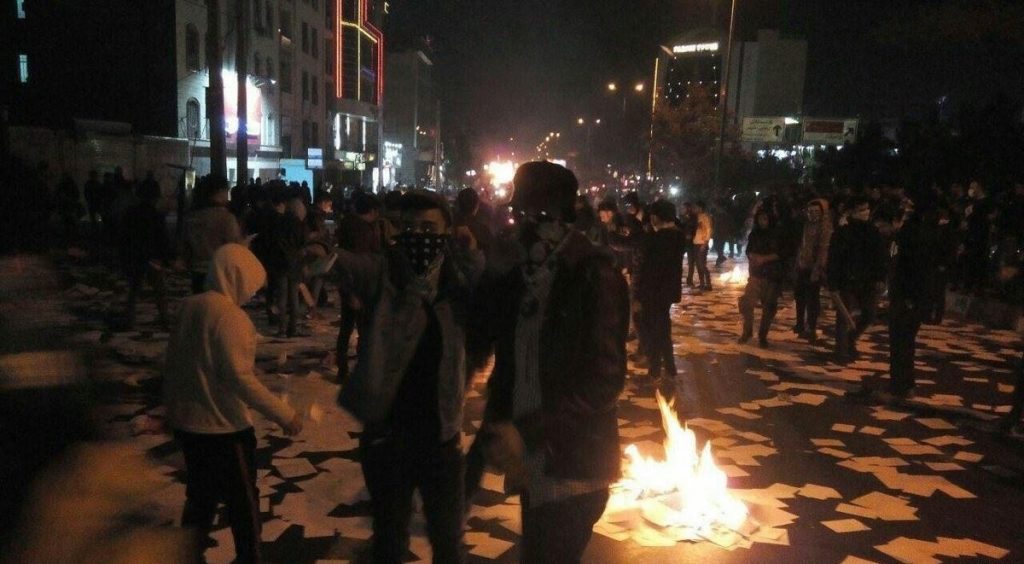
Links:
- 2017–18 Iranian protests (Wikipedia.org)
- Vänsterpress om Iran (pdf) (Marxistarkiv.se, 14. januari 2018, 20 s.). “Om massprotesterna december-januari.”
- 2018–2019 Iranian general strikes and protests (Wikipedia.org)
- 2019-20 Iranian protests (Wikipedia.org)
- 2021–2022 Iranian protests (Wikipedia.org)
- Hands of Iran! (site)
Præstestyrets greb om Iran er under pres: hvordan samler venstrefløjen vreden op? Af Farrokh Jafari (Solidaritet.dk, 19. december 2021). “Iran er på vej ned ad en lang, nedadgående spiral. Der er fortsat mange protester i Iran, men venstrefløjen er splittet og svækket. Det kræver, at venstrefløjen fra andre lande kommer til undsætning.”
En ny bølge af protester og strejker skyller ind over Iran: hvad er baggrunden denne gang? Af Frieda Afary (Solidaritet.dk, 14. august 2021). “‘Ned med præstestyret!’. Protester i Teheran har været et hyppigt syn siden 2016. Denne gang er baggrunden blandt andet mangel på rent drikkevand i store dele af landet.”
Oliearbejdere i Iran oplever solidaritet og organiserer sig på nye måder i landsdækkende strejke (Arbejderen.dk, 6. august 2021). “Tusindvis af oliearbejdere i Iran organiserer sig på nye måder og oplever solidaritet i strejken for højere løn og bedre arbejdsvilkår.” Interview med Iran-forsker Rasmus Elling.
Iran: Luk internettet og slip afsted med mord (Solidaritet.dk, 22. november 2019). “Niloufar Rostami beretter om det igangværende oprør i Iran, som landets præstestyre forsøger med al magt at skærme fra omverdenen. Internettet er blevet lukket ned i et langt mere drastisk omfang end set ved tidligere protester mod regimet.” Se også Tag: Iran.
Oprøret i Iran ved årsskiftet 2017-18 (Socialistisk Information, 3. februar 2018). “Interview med Farrokh Jafari, politisk flygtning fra Iran og mangeårigt medlem af Enhedslisten.”
“Den iranske modstand har kun en chance, når den forbliver på gaden” (Autonom Infoservice, 12. januar 2018). “Interview med Reza Mohajerinejad, der var en af de fremtrædende aktivister i studenter- og ungdomsrevolten mod det iranske præstestyre i juli 1999.”
Iran i oprør (Socialistisk Arbejderavis, nr.362, 5. januar 2018). “Nick Clark har talt med to iranske socialister, Nima Soltanzadeh og Massoud om, hvad der ligger bag demonstrationerne – og hvad de betyder for kampen i Iran.”
Revolutionær uro i dybet af det iranske samfund. Af Hamid Alizadeh (Revolution, 3. januar 2018). “Protesterne er uden fortilfælde i den Islamiske Republiks historie.”
Striking echoes in Iran: A report from the oil and gas strikes (Tempest, August 1, 2021). “Nasrin and Sam Salour report on the growing strike movement in Iran and analyze the historic dynamics and ironies in the strike, and what it means for the theocratic regime.”
Anger finds open expression (Weekly Worker, Issue 1355, 29 July 2021). “From Isfahan to Tabriz, Karaj to Tehran, the slogans are clear: ‘Death to the dictator’, ‘Shame on Khamenei’, ‘Hands off Iran’. Yassamine Mather reports on the upsurge of protests.”
Iran: a new wave of mass protests and strikes. By Frieda Afary (Iranian Progressives in Translation/Blog, July 25, 2021). “Iran is experiencing another wave of mass protests and strikes as economic, social, political, environmental and health problems make it impossible for the large majority of the population to have the bare minimums needed to live.” På dansk: En ny bølge af protester og strejker skyller ind over Iran (Solidaritet.dk, 14. august 2021).
Three waves of protest (Weekly Worker, Issue 1333, 4 February 2021). Supplement: “Feelings of injustice, a lack of rights and a sense of betrayal have become universal and act as psychological and subjective drivers of protest, writes Ardeshir Mehrdad. But how can protest be forged into a movement than can topple the regime?”
Protests in Iran: a Marxist analysis (Mutiny, 30 January 2020; online at Internet Archive). “Ardeshir Mehrdad argues for a New Left in Iran and the wider Middle East that can unite the masses in struggle against imperialism and neoliberalism.”
Why the latest uprising in Iran matters (Jacobin, 21 December 2019). Interview with Frieda Afary: “Mass protests kicked off in Iran last month over an increase in fuel prices, resulting in a government crackdown in which over 7,000 protesters were arrested and 200 killed. An Iranian trade unionist explains what these protests have looked like on the ground and why leftists should support them.”
Regime faces new crisis. By Yassamine Mather (Weekly Worker, Issue 1276, 21 November 2019). “… there are hundreds of videos of protests in Iran, showing people shouting ‘Death to Khamenei’, and videos of security forces opening fire on protestors. But I have seen just one video showing people shouting pro-shah slogans.”
Iran: rising of the dispossessed. By Hamid Alizadeh (In Defence of Marxism, 19 November 2019). “On Friday, the Iranian government made a surprise announcement of deep cuts to fuel subsidies, which is a vital lifeline for poor Iranians. Since then, thousands of youth have taken to the streets, clashing with the police, military and paramilitary forces.”
What’s the deal in Iran? (Socialist Worker, Issue 2604, 18 May 2018). “Nick Clark looks at how decades of Western rulers’ meddling in Iran have meant coups, repression and war. But recent movements also show potential for resistance.”
Iran: a revolutionary opening. By Robert Bechert (Socialism Today, Issue 215, February 2018). “Mass protests in December and January shook Iran’s reactionary regime to the core. Although facing severe repression, they signal a new confidence and preparedness by workers and young people to fight for their rights, in opposition to systemic corruption, repression and inequality.”
A ‘blue’ generation and protests in Iran. By Aghil Daghagheleh and Zakia Salime (Middle East Report Online, January 22, 2018). “The current protests can best be understood as the emergence of a generation whose members are totally alienated from a political regime they view as superstitious, regressive and backward.”
The moral economy of the Iranian protests. By Kaveh Ehsani and Arang Keshavarzian (Jacobin: Reason in Revolt, 11 January 2018). “Beset by inequality and corruption, Iran’s provincial working classes are revolting against the revolution’s broken promises.”
The Iran protests: The Revolution is dead. Long live the Revolution! By Fouad Oveisy and Behnam Amini (New Socialist, January 10, 2018). “The new protest movement is not only primarily working-class, with demands centered around social and economic justice, but also more defiant, visibly less conciliatory in tone, and equipped with a strongly anti-establishment array of slogans.”
The new resistance in Iran (SocialistWorker.org, January 10, 2018). “Frieda Afary is a member of the Alliance of Middle Eastern Socialists. Afary was interviewed by Ashley Smith about the causes of the ongoing revolt and the nature and prospects of the new Iranian resistance.”
“The working class is the key” (Solidarity & Workers’ Libertry, No.458, 10 January 2018). Interview with Moran Shirin, the Iranian Revolutionary Marxist Tendency + Aman Kafa, the Worker Communist Party Iran.
The greatest radicalisation since 1979 as Iran explodes. By Foad Asabani (International Viewpoint, 6 January 2018). “What began as a small protest in Mashhad, north-east Iran, against price rises, high unemployment and other economic grievances has spread across 65-70 towns and cities around the country.”
The greatest radicalisation since 1979 as Iran explodes. By Foad Asabani (Red Flag, 3 January 2018). “What began as a small protest in Mashhad, north-east Iran, against price rises, high unemployment and other economic grievances has spread across 65-70 towns and cities around the country.”
Why are people in Iran protesting? (Counterfire, January 3, 2018). “Since Thursday last week, Iran has been gripped by a new social unrest across a number of cities. Naz Massoumi gives some context to the unfolding crisis.”
What’s behind the protests in Iran and what can you do? By Owen Tudor (Trades Union Congress, TUC, 2 January 2018). “Many protests were about basic economics – unemployment or low pay, high prices for basic foodstuffs like eggs – but there have also been reports about political aspects to the protests.”
Se også:
- 2021–2022 Iranian protests (Wikipedia.org)
- Mahsa Amini protests (Wikipedia.org)
- Hands of Iran! (site)
Iran: Uden tvangs-hijab ingen islamisk republik (Autonom Infoservice, 29. september 2022). “Det er en opstand mod tvangs-tilsløringen i Iran, en kamp mod hele det patriarkalske system.”
Alle frygter en massakre i Iran. Af Morten Hammeken (Solidaritet.dk, 29. september 2022). “Internettet er lukket ned, og mange frygter en massakre i Iran. Aida Ghajar, der breakede nyheden om mordet på Mahsa Amini, ser et stort pres på regimet, men frygter også en ekstremt voldelig modreaktion. Den frygt deler både danskere med iransk baggrund og forsker i Irans historie. Alligevel mener de alle, der er sket noget nyt denne gang.”
Den iranske revolution 2022. Af Emil Vatani (Solidaritet.dk, 27. september 2022). “Selv om det langt fra er første gang befolkningen rejser sig i protest, understreger demonstrationerne i Iran, at regimets dage er talte. Det kan risikere at blive meget blodigt at få præstestyret til at slippe sit kvælertag på en befolkning, der kræver forandring.”
Interview: Iran’s rising for dignity and freedom (International Socialism, Issue 177, Winter 2023). “Iranian historian and socialist Peyman Jafari spoke to Naima Omar and Nick Clark on the cracks and contradictions in Iranian society that lie beneath the revolt and shape its significance and its prospects for success.”
Inequality, gender apartheid & revolt (Against the Current, Issue 222, January-February 2023). Suzi Weissman interviewed Yassamine Mather, an Iranian scholar and chair of Hands Off the People of Iran, on the demonstrations following Jina (Mahsa) Amini’s murder.
Three months of rebellion in Iran (Red Flag, 18 December 2022). “After three months of protests, Iranian socialist Bella Beiraghi celebrates the resilience of the rebellion, and outlines debates about how it can win.”
The killing of Mahsa (Weekly Worker, Issue 1411, 22 September 2022). “Yassamine Mather says the imposition of the ‘full hijab’ by the Gasht-e Ershad morality police is a class issue. Richer Iranian women, the well-connected, have little to fear.”
Se også på Socialistisk Bibliotek:
- Linksamlingen: Iran 1979
- Linksamlingen: Oprøret i Iran 2009
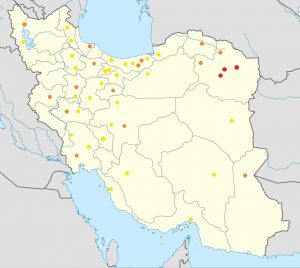
Cities by day first affected by protests
Kilde: Wikipedia.org. Klik på billede for større kort


















![George Habash square [Tulkarem?], Taken on 7 April 2011, Source: https://www.panoramio.com/photo/50717122. Author: Mujaddara. (CC BY-SA 3.0)](https://socbib.dk/wp-content/uploads/2007/05/George_Habash_sq_-_panoramio-218x150.jpg)














Very good site. You might find this http://www.internationalviewpoint.org/ a good source, Trotskyist, Fourth International.
And this site which publishes from a variety of mainyl leftwing sources in English and French
Regards
Hi
Forgot to include the link mentioned above. https://www.europe-solidaire.org/spip.php?page=sommaire&lang=en
Old age
Comments are closed.